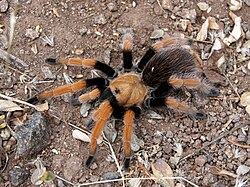Biology:Aphonopelma bicoloratum
| Aphonopelma bicoloratum | |
|---|---|

| |
| Scientific classification | |
| Domain: | Eukaryota |
| Kingdom: | Animalia |
| Phylum: | Arthropoda |
| Subphylum: | Chelicerata |
| Class: | Arachnida |
| Order: | Araneae |
| Infraorder: | Mygalomorphae |
| Family: | Theraphosidae |
| Genus: | Aphonopelma |
| Species: | A. bicoloratum
|
| Binomial name | |
| Aphonopelma bicoloratum Struchen, Brändle & Schmidt, 1996[1]
| |
Aphonopelma bicoloratum (also known as Mexican blood leg), is a species of tarantula found in Mexico.[1] As its common name aptly states it is found in Mexico, and was first described by Ronny Struchen, D. Brändle and Gunter Schmidt in 1996. It is named after the Latin word bicoloratum, meaning bicolored.
Description
As its common name suggests, its legs are an orange color, which ranges from the metatarsus to the femur, the tarsus and trochanters being black. Its carapace is the same orange color as the legs, with the opisthosoma and chelicerae being black. The opisthosoma is also covered with long slender reddish hairs. Females live around 20 to 25 years, and males 5 to 7 years, under proper care of course.[2]
Habitat
It is found in South Western Mexico, though it is not clearly stated where, there habitat where they are found are mainly deserts and scrublands, alongside the pacific side of the country.[2] The deserts and scrublands of South Western Mexico, are few and far between. This are found mainly in Puebla,[3] where the main plants are Agave, Yuca, Opuntia, Aristida and Stipa. The average yearly rain fall is 450mm and 22 °C is the average temperature.[4]
Behavior
As a new world species, this tarantula possesses urticating hairs, which it may kick if it feels threatened. As a terrestrial species, it does not usually make webbings or burrows. Similarly to other species in its genus, it is considered docile and slow moving.
References
- ↑ 1.0 1.1 .Hamilton, C. A.; Hendrixson, B. E.; Bond, J. E. (2016), "Taxonomic revision of the tarantula genus Aphonopelma Pocock, 1901 (Araneae, Mygalomorphae, Theraphosidae) within the United States", ZooKeys (560): 1–340, doi:10.3897/zookeys.560.6264, PMID 27006611
- ↑ 2.0 2.1 "Mexican Blood Leg Tarantula (Aphonopelma bicoloratum) Care" (in en-US). https://www.thetarantulacollective.com/caresheets/aphonopelma-bicoloratum.
- ↑ CONABIO. "Matorrales" (in es). https://www.biodiversidad.gob.mx/ecosistemas/Matorral.
- ↑ "Medio Físico - Puebla". http://www.inafed.gob.mx/work/enciclopedia/EMM21puebla/mediofisico.html.
Wikidata ☰ Q1948341 entry
 |

